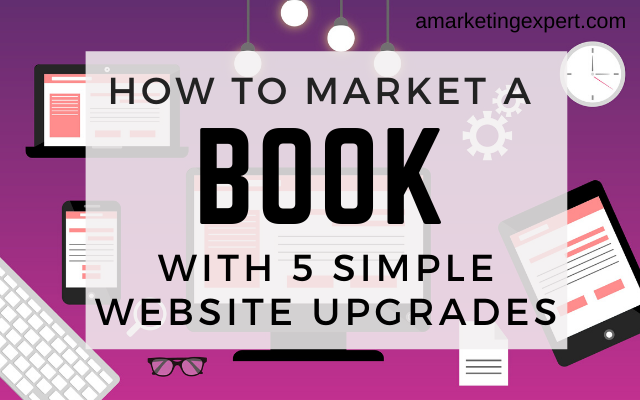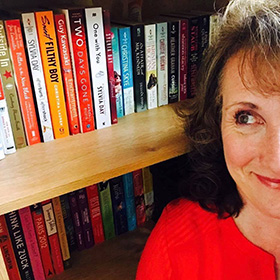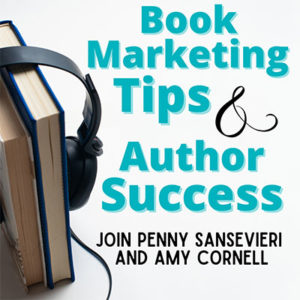Learning how to market a book effectively with your author website can help you win back some of your lost book sales from Amazon.
Do I have your attention?
You may not want to actually sell and ship books from your website, but it’s still a sales tool – even if your reader hops off your website to head over to Amazon or their local bookstore to get your book.
So is your author website selling your book?
Are you sure? If you’re not, you aren’t alone.
Most of us kind of make due with our author website and I mean let’s face it, some of it is pretty mysterious when figuring out how to market a book, right? Terms like Alt tags and SEO make our head spin. But turning your website into a book selling sales machine is much easier than that. In the end, it’s really just about the reader experience.
It only takes a half a second (50 milliseconds) to form some kind of an opinion about your website. That’s not a lot of time. If you want to make the most of that time, let’s look at some simple things you can do to spruce up your site and crank up the book sales.
Keep Your Author Website Simple
Unless your book is connected to a business, you really only need a five-page website – seven pages if you have a lot to say or maybe other books in a series.
I see a lot of websites that remind me of the Winchester House – are you familiar with that? It’s the house that has a ton of rooms that literally go nowhere.
Keep your website simple.
We often believe that overcomplicating something makes it better – but we know (and especially when it comes to deciding how to mark a book) that’s often not the case.
I bet if you look at your website you can probably find one or two pages that aren’t really working well, or unnecessary. A lot of times I see authors with elaborate book pages, meaning the book itself is housed on one page, the book description is on another, and the about the author is somewhere else altogether – it’s way too much.
Remember that if your reader has to go hunting for information, there’s a good chance they’ll just give up.
Shorten the Staircase to Your Sale
I love this term, mostly because it’s so visual.
How many flights of stairs would you climb to buy a book? Probably not many.
So why do authors often put their book so far away, with so many clicks, that the reader finally gives up?
When you’re on your website, how easy is it to get to your book page – the page that either sells the book, or sends the reader to Amazon?
Ideally it should be one click – if it’s more, I can almost guarantee that you’ve lost your potential buyer and reader. Every time you ask someone to click (or climb another staircase), you risk losing the sale.
Images on Your Website Matter So Much
While words are great, images are better.
In fact a study shows that 38% of people will leave a website that’s unattractive and images go a long way to giving a website a better look and feel.
Yes, words are important but remember that people don’t read, especially online. Your website isn’t a magazine, consumers scan and you have to task this into consideration when deciding how to market a book for more sales.
I recommend keeping your page content to 250 words whenever you can.
Add colorful images wherever possible to enhance the content and help draw the consumer further into your website.
A Newsletter and Bonus Content are Critical
I’m a huge fan of newsletters and even if you’re on social media I highly recommend that you have a newsletter.
Send out a note to readers once a month. It’s a great way to communicate your message and stay in touch.
A newsletter sign-up is easy to add to any website, in many cases you’re just a few clicks away from this.
Not only is it a good way to communicate with your reader but it’s a way to stay on their radar screen – especially if you have more books coming out!
Bonus content is something else that I love.
The reason is that it invites the reader to stay longer on your author website.
Bonus content can be anything from deleted scenes from your book, or maybe a partner workbook that you invite readers to download if they’ve purchased your book.
I have seen authors get really creative with this using video, audio, or just fun enhancements to their books. Maybe a map of your fictional town? I’ve seen this and it’s a fabulous user experience!
Anything that you can do to enhance the reader experience and keep them on your site gets you many steps closer to closing a sale and building your fan base.
Your Look and Your Brand Seal the Deal
Consider this stunning statistic: 75% of consumers judge you based on your website.
So what does your author website look like? For some of you, this might be a bigger issue – it might mean an entire website overhaul.
But if you’re serious about your writing career, and determining how to market a book for long term success, it might be time to look at this.
Your brand, how you show up in the world, is everything when it comes to building your reputation online. Whether you’re selling fiction or non-fiction – your website might be an extension of your business, or a way to build your fiction writing career.
Regardless of what your book marketing goals are, your website should be an extension of that brand, the “look” that is distinctly you.
Branding is sort of a tricky term, because it means a lot of things. But when it comes to your website it’s really a visual representation of who you are. What your author-self looks like.
In the end, it’s really your resume.
Websites are fantastic tools, and if used correctly websites can really help to drive sales and keep your readers coming back.
Sometimes it only takes small tweaks to spruce up your website.
If you aren’t sure how well your website is doing, and before you dig into these changes I recommend adding Google Analytics to your website. It’s really easy to do and the tiny bit of code is a super simple addition.
Many site design resources like WordPress have easy instruction or plug ins to help install this.
The reason you want to this is it’ll enable you to get a better sense of your traffic and how long people are staying on your site and where folks are coming from!
Author websites can be complex, but there’s a lot of help out there that’s really simplified much of the process, making it even easier to create a website that drives traffic, and helps you make smart decisions about how to market a book in today’s retail landscape.
Resources and Free Downloads
Statistics I quoted were found in this piece: https://www.sweor.com/firstimpressions
Download your free user profile worksheet!
8 Most Common Book Marketing Mistakes Authors Make





0 Comments